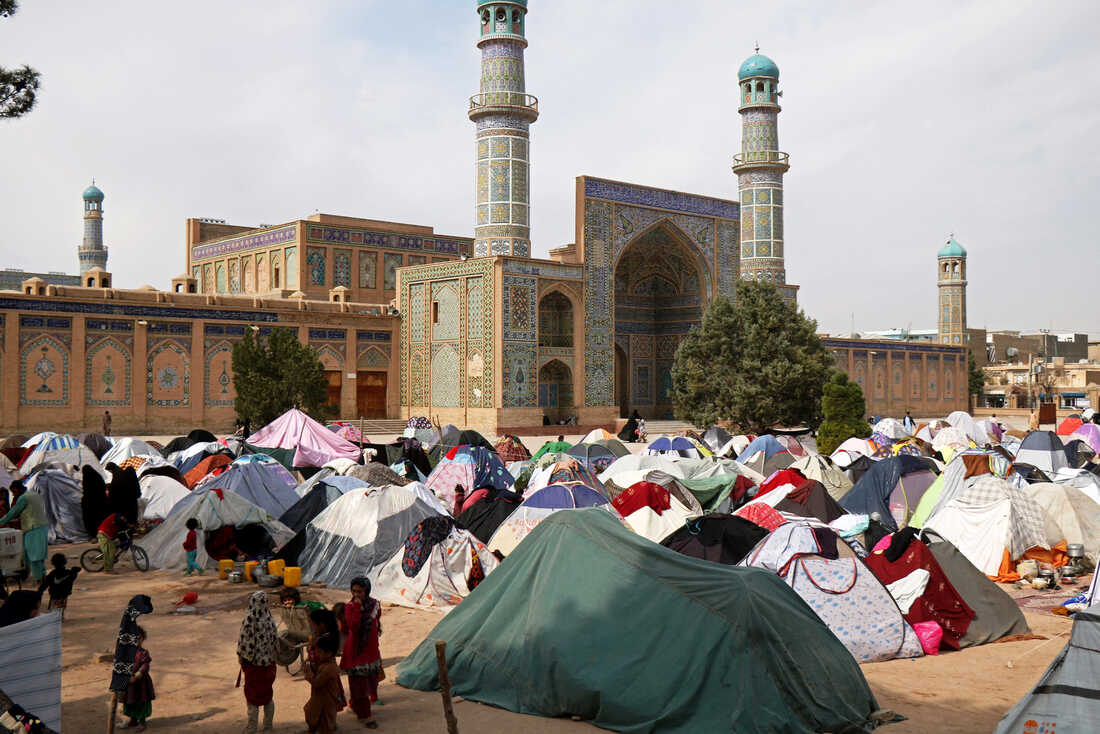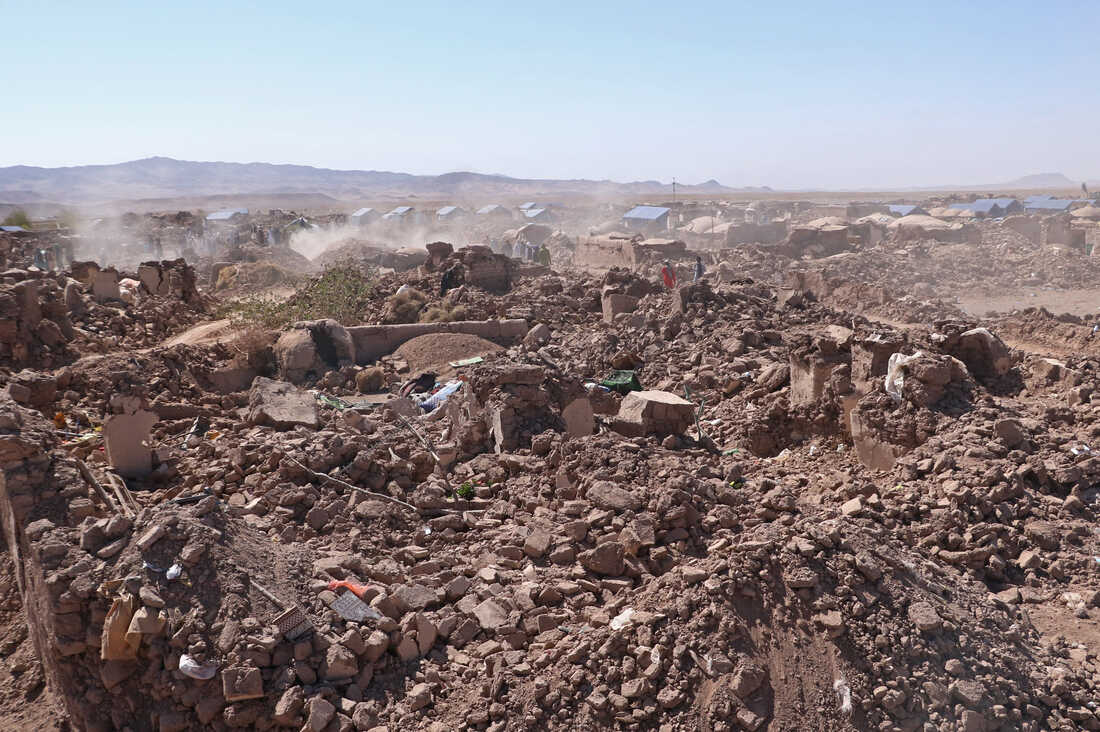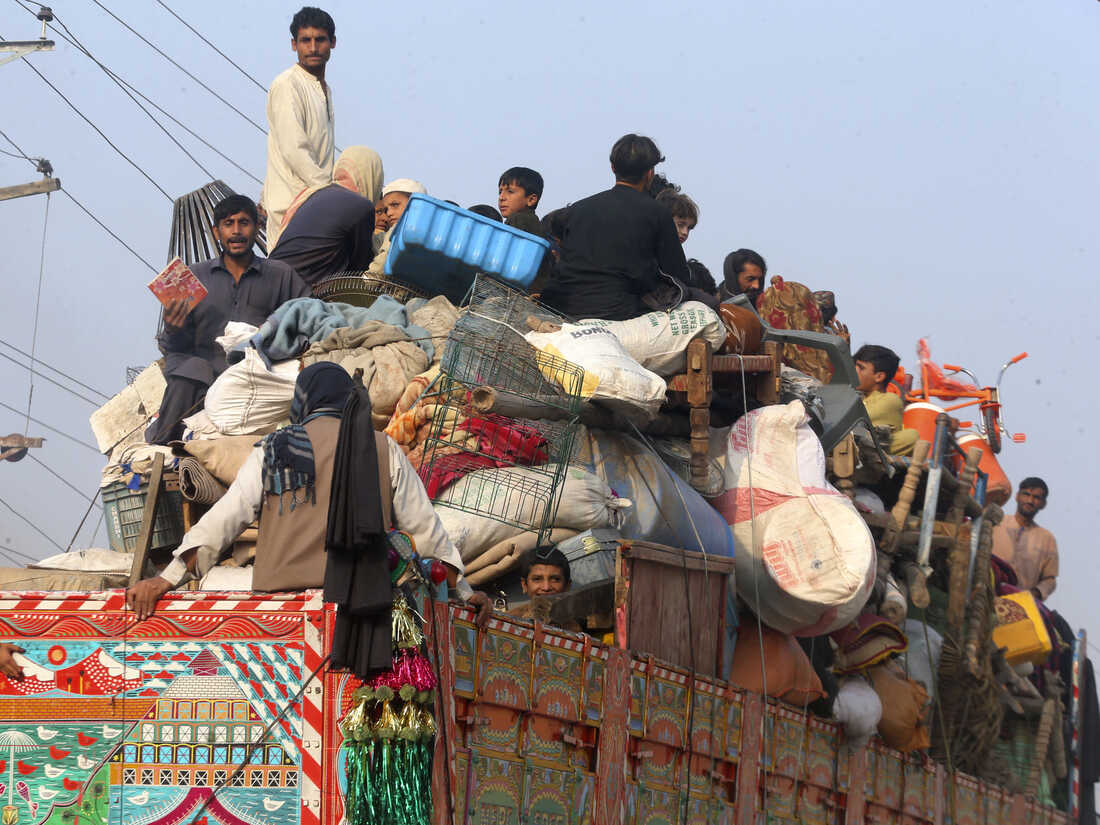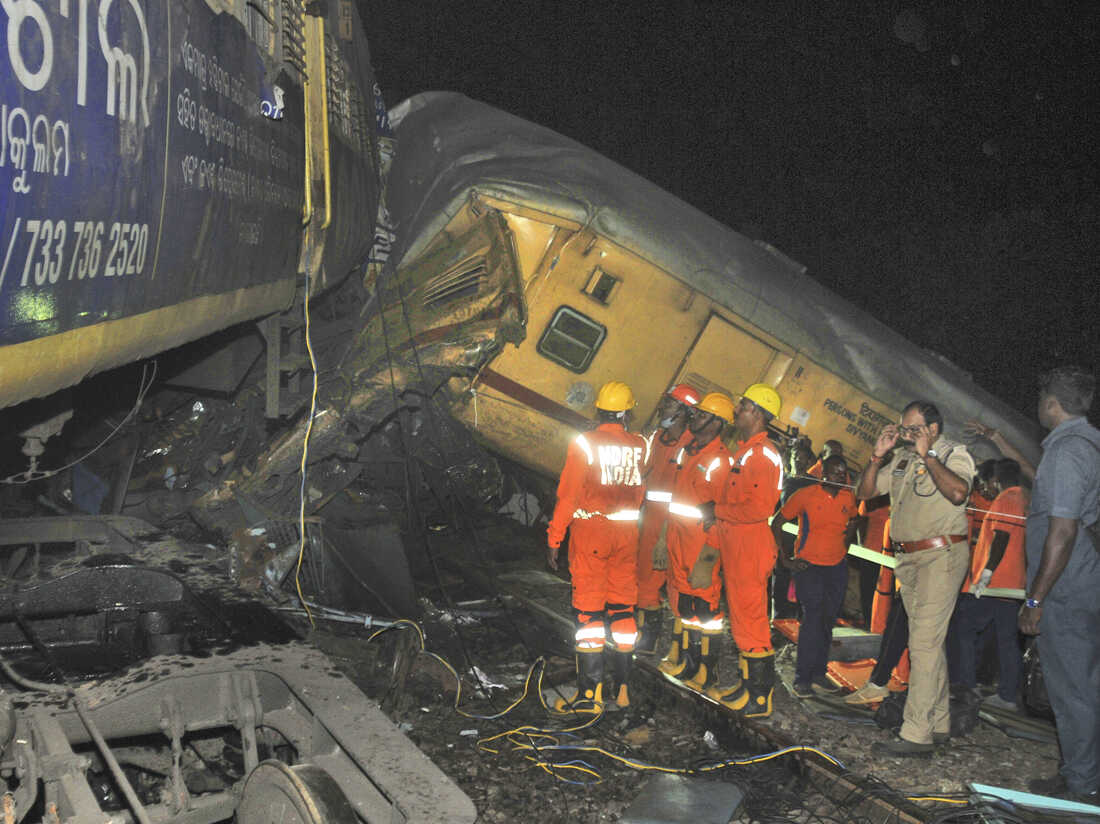Quakes killed thousands in Afghanistan. Critics say Taliban relief efforts fall short
By Ruchi Kumar|Hikmat Noori
Children walk past makeshift shelters in front of the Jami Mosque in Herat just two days after a magnitude 6.3 earthquake in western Afghanistan on Oct. 15. Mohsen Karimi /AFP via Getty Images hide caption
toggle caption Mohsen Karimi /AFP via Getty ImagesChildren walk past makeshift shelters in front of the Jami Mosque in Herat just two days after a magnitude 6.3 earthquake in western Afghanistan on Oct. 15.
Mohsen Karimi /AFP via Getty ImagesA series of devastating earthquakes over the last two weeks in western Afghanistan has resulted in thousands of casualties and left thousands more homeless.
Aid workers on the ground say the Taliban is ill-prepared to deal with such a catastrophe. NPR talked with five aid workers involved in the response; they say recovery has been further hampered by the isolation from international support that resulted when the Taliban took power in 2021 and their decision to ban and remove women staffers from aid organizations.
"There are a lot of gaps in the ANDMA's [Afghan National Disaster Management Agency] capacity, in terms of structure, policy and planning, logistics, but most importantly in human resources and expertise," says Basir, an Afghan disaster management expert who asked to be identified by his first name, fearing Taliban reprisals for being critical of their government.
Doctors and paramedics treat injured earthquake survivors in front of the Herat Regional Specialized Hospital. Mirwais Amir/Anadolu via Getty Images hide caption
toggle caption Mirwais Amir/Anadolu via Getty ImagesDoctors and paramedics treat injured earthquake survivors in front of the Herat Regional Specialized Hospital.
Mirwais Amir/Anadolu via Getty ImagesA troubled recovery effort
According to the U.N. Office for the Coordination of Humanitarian Affairs (OCHA), the earthquakes have collectively killed more than 1,480 people and affected 27,150 across six districts of Herat. The Taliban's Ministry of Disaster Management gave a higher number, stating that .
"There are villages that have been completely destroyed with not a single house left standing," Jamie Nadal, United Nations Population Fund (UNFPA) representative in Afghanistan, tells NPR. "As of [October 16], slightly over 200 villages have been assessed by the U.N. But we know that more than 500 have been affected by the earthquakes."
Afghan residents clear debris from a damaged house after an earthquake in the Zendeh Jan district of Herat province on Oct. 7. Mohsen Karimi /AFP via Getty Images hide caption
toggle caption Mohsen Karimi /AFP via Getty ImagesAfghan residents clear debris from a damaged house after an earthquake in the Zendeh Jan district of Herat province on Oct. 7.
Mohsen Karimi /AFP via Getty ImagesThe Taliban's interference in aid, Nargis says, is also slowing down rescue and relief efforts. "Some local and government officials wanted all the aid allocated for the earthquake victims to be shared with them before distribution," she says.
Aid workers on the ground tell NPR they are struggling to provide accurate casualty figures. "We are still assessing the situation, the figures are likely to rise as many families are still missing members who might be under the debris," said Rahimi, an aid worker from Herat. NPR is using only his last name because the NGO he works for has forbidden staff to talk to the media. Ten days after the quake the authorities should have a better idea of casualties, he says, but parts of the affected area have yet to be excavated.
Restrictions imposed by the Taliban have also fueled concerns about ensuring long-term support and resources. These concerns predate the earthquakes. A U.N. OCHA report released just days before the quakes in August alone that hampered the ability of humanitarian agencies to provide assistance, 99% of which were attributed to the Taliban. The incidents included detention of humanitarian workers; interference with programming, staff recruitment and beneficiary selection; and requests for staff lists and sensitive data.
– even as women survivors also bear the brunt of the recovery effort's shortfalls.Nadal attributes the higher casualties among women and children to the timing of the disaster. "The first earthquake happened at around 11 in the morning, and at that time of the day many men are working in the fields, while a lot of the women and children are in the houses," he says
What's more, the Taliban's rigid strictures on gender have made it difficult for women to benefit from post-earthquake aid.
Since taking over, the Taliban have imposed a number of restrictions on women's freedoms and movements, including a ban on women working for NGOs.
"The Taliban's ban on women aid workers will inevitably have an impact on situations like this," says Heather Barr, associate director of the Women's Rights Division at Human Rights Watch (HRW).
"Afghanistan being a deeply conservative society, public spaces are often gender segregated, which means women's access to resources and support during a disaster becomes severely limited if women [from aid groups] aren't allowed to help them," she says. That makes it much harder for women survivors of the quake to access medical services or food aid.
, particularly health-care workers, among volunteer teams at the site of the disasters.Aid workers say that public gesture of inclusion, made after appeals from various organizations, was too little and too late.
"One of the challenges we faced in the first few days was burying the bodies of women who had died, since there were no women to help wash the bodies and fulfill religious requirements," Rahimi says. The International Federation of Red Cross and Red Crescent Societies eventually stepped in to provide dignified burial services for victims.

The scene after a series of earthquakes in the Zendeh Jan district of Herat province on Oct. 9, as volunteers look for survivors and dead bodies. Some Afghan aid specialists say Taliban recovery efforts have been inadequate. Mohsen Karimi /AFP via Getty Images hide caption
toggle caption Mohsen Karimi /AFP via Getty ImagesThe scene after a series of earthquakes in the Zendeh Jan district of Herat province on Oct. 9, as volunteers look for survivors and dead bodies. Some Afghan aid specialists say Taliban recovery efforts have been inadequate.
Mohsen Karimi /AFP via Getty ImagesFading hopes for finding loved ones
With passing days, the hope of finding loved ones, even their bodies, are fading.
Nearly a week after the first tremors brought down his house in Zindajan district of Herat, Ghulam Mortaza, 37-year-old daily wage laborer, is still searching in the debris of the home. "I have lost everything to this earthquake. Two of my children and my mother were killed. My 9-year-old daughter is still missing," he told NPR over a phone call.
In the backdrop of the call, his wife 33-year-old Marzia, could be heard weeping softly. She lost her parents in the disaster. But the couple has no time to mourn because they continue to look for their daughter.
"We have been looking under every rock and stone around us, but there is still no sign of her," Marzia said, between sobs. "I am digging this ruined land by myself to find my little girl."



